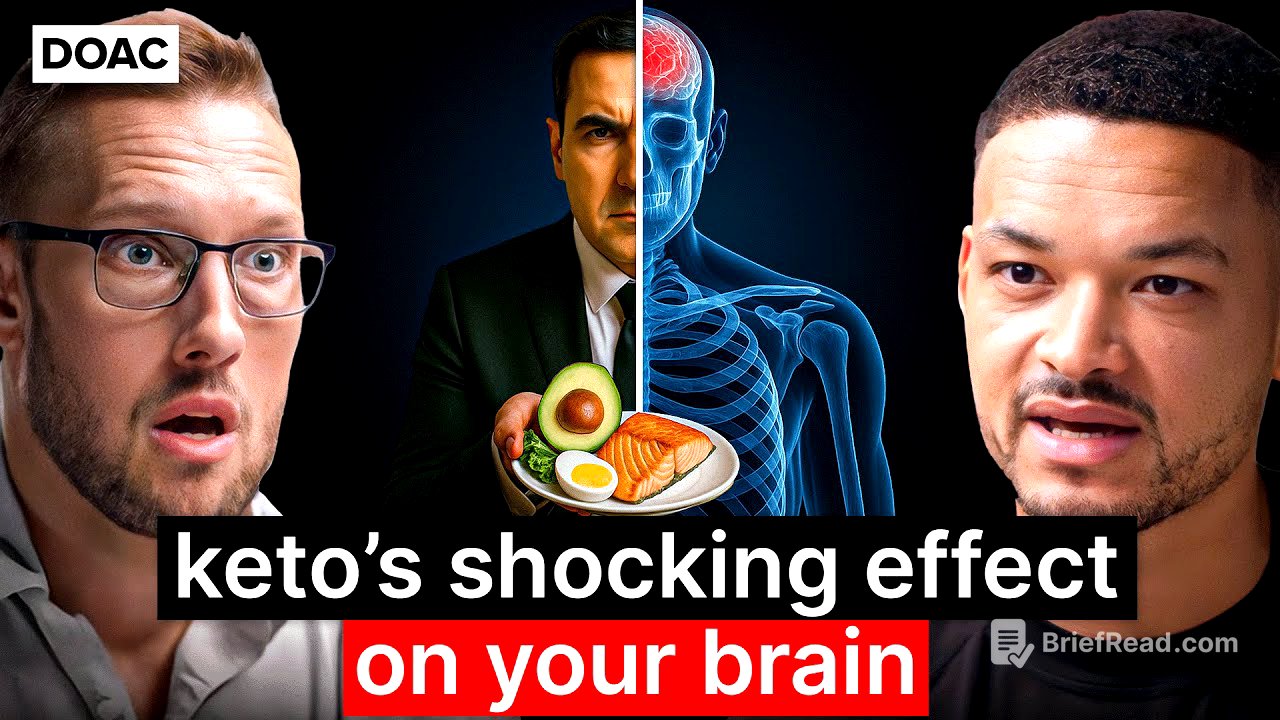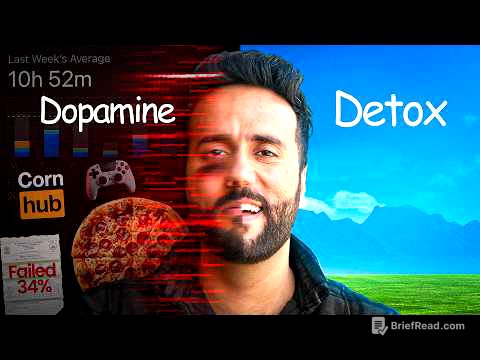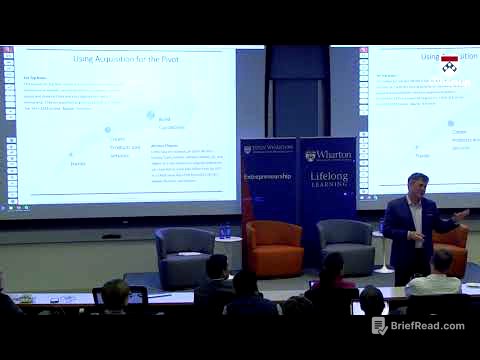TLDR;
In this episode of The Diary Of A CEO, Dr. Andrew Kutnik, a research scientist specializing in metabolic health, diabetes, and the keto diet, shares his journey and insights. He emphasizes empowering individuals to take control of their health through science-backed strategies. The discussion covers the impact of high blood sugar on long-term health, the ketogenic diet, exogenous ketones, and practical advice for improving overall well-being.
- Dr. Kutnik's mission is to empower individuals to take control of their health using scientific insights.
- High blood sugar is identified as a major cause of long-term health issues, with carbohydrates being a primary regulator of glucose levels.
- The ketogenic diet and exogenous ketones are discussed as tools for managing blood sugar, improving cognitive function, and potentially aiding in various health conditions.
Intro [0:00]
Dr. Andrew Kutnik talks about enhancing cognition by 50% and delaying metastatic cancer progression through research-backed strategies. Having dealt with multiple chronic diseases, one of which he reversed, he found that the most effective strategies were often not provided in standard medical advice. He aims to share these tools to empower others to manage their health.
What's Your Mission? [2:25]
Dr. Kutnik's core mission is to empower individuals to take control of their health by bridging the gap between complex scientific research and practical action. He aims to provide patients with the same tools and strategies he has used to maximize their health and performance, drawing from his 15 years of research and personal experience with chronic diseases.
What Areas of Health Have You Spent the Last 15 Years Researching? [3:18]
Dr. Kutnik has spent the last 15 years researching metabolism, focusing on how the body utilizes nutrients and responds to food. This includes understanding glucose levels, insulin responses, and the impact of nutrition and exercise on overall health. His journey began with a personal desire to optimize his own health, leading him to discover powerful strategies often overlooked in conventional medical advice. He shares his personal story of struggling with obesity despite following recommended health practices, which eventually led to a diagnosis of a chronic, irreversible disease.
High Blood Sugar Is the Biggest Cause of Long-Term Health Problems [9:24]
Dr. Kutnik emphasizes that managing blood glucose is paramount for overall health, especially in preventing cardiovascular disease, the leading cause of death in the United States and among diabetics. High average blood glucose, measured by HBA1C, is a strong predictor of diseases affecting the eyes, kidneys, and cardiovascular system. He likens focusing on other health aspects without addressing glucose control to focusing on a car's rims without an engine.
The Keto Diet [13:20]
The ketogenic diet involves dramatically reducing carbohydrate intake, a strategy historically used to manage diabetes since 1796. A well-formulated keto diet includes green leafy vegetables, protein from meat, fish, eggs, and healthy fats from olive oil and avocado oil. The diet excludes sugary and starchy carbohydrates like bagels, donuts, white rice, and pasta, as these rapidly elevate blood sugar levels and spike insulin, which inhibits fat breakdown.
Regulating Elevations in Blood Glucose [18:17]
Dr. Kutnik explains that high and low blood sugar levels can cause symptoms like fatigue, irritability, and lack of concentration. Consuming carbohydrates, such as those found in oranges, elevates blood glucose levels, prompting the release of insulin to store glucose in tissues. While some foods are considered healthy, individuals with metabolic dysfunction may be more vulnerable to their effects.
Food Patterns Through Evolution [21:29]
Dr. Kutnik shares that the ketogenic diet mimics the physiology of fasting, which has evolutionary roots as a survival mechanism during periods of food scarcity. Fasting and ketogenic diets have been used therapeutically for centuries, notably to manage seizures. He consumes three oranges, which contain 70 to 90 grams of carbohydrates, to demonstrate the impact on blood sugar levels.
What Do You Notice When You're in Keto vs. Not in Keto? [25:56]
Dr. Kutnik shares his personal experience with the ketogenic diet, noting that it helps him maintain stable blood sugar levels and reduces his insulin requirements by over 40%. His doctor, who was also the American Diabetes Association president, was surprised to see his blood sugar levels consistently in the normal range. He highlights that poor glucose control in children with type 1 diabetes can lead to neuroanatomical changes in the brain and early signs of cardiovascular issues.
Should We Be Restricting Carbs? [33:32]
Dr. Kutnik advises being conscious of carbohydrate consumption, especially for those with chronic diseases, as restricting carbohydrates can have therapeutic effects on conditions like type 2 diabetes and Alzheimer's disease. He terms this approach "therapeutic carbohydrate restriction," aiming to improve overall health. Given that 93% of Americans have some form of metabolic derangement, this approach can be beneficial for many.
10-Year Study on the Impact of the Keto Diet [35:19]
Dr. Kutnik discusses a 10-year study monitoring a patient with type 1 diabetes who switched to a ketogenic diet in 2013 after following the American Diabetes Association diet for six years. Despite a near doubling of LDL cholesterol, the patient maintained normal glycemic control, reduced insulin load by over 40%, and showed remarkable cardiovascular health, better than average patients with or without type 1 diabetes. This study, along with an analysis of over 46,000 patients, showed that very low carbohydrate ketogenic diets can normalize glucose control in over 70% of patients with type 1 diabetes.
Your Blood Sugar Levels Have Risen [38:39]
Dr. Kutnik observes that his blood sugar levels have risen after consuming oranges, which are considered a superfood by the American Diabetes Association. He explains that glucose spikes can cause feelings of thirst, dry mouth, headache, brain fog, and fatigue. When glucose levels crash, it can lead to jitteriness, shakiness, hunger, irritability, and anxiety.
The Keto Diet and Physical Performance [44:21]
Dr. Kutnik discusses a 2025 study on the impact of the ketogenic diet on physical performance. While carbohydrates have been recommended for sports nutrition since 1921, studies from 2017 to 2020 showed a performance decline of about 2% on a ketogenic diet over a 5-day to 3-week period. However, these studies often failed to account for the adaptation period to the ketogenic diet, which is four weeks or more. A study controlling calories, body composition, and activity levels found no deterioration in performance after four weeks on a ketogenic diet, even in glucose-dependent exercises.
Exogenous Ketones [52:09]
Dr. Kutnik explains that exogenous ketones are externally supplemented ketones that can rapidly elevate ketone bodies in circulation within minutes. These can be beneficial for those who need to quickly shift into a ketogenic state. Exogenous ketones have a blood glucose-lowering effect, bind to receptors that impact inflammation, and change gene expression to increase antioxidant capacity. Studies have shown that they can improve physical performance and attenuate cognitive decline in patients at risk for Alzheimer's disease.
Exogenous Ketones for Mental Health [56:27]
Dr. Kutnik notes the emergence of studies on ketone-based therapies for serious mental illness, with about 11 active clinical trials. Given that one in four adults in the United States has a serious mental illness, the potential for nutrition to impact brain health is significant. Studies suggest that exogenous ketones can increase brain network stability and may protect against brain aging.
Exogenous Ketones Helping With Cancer Body Weight Increase [58:39]
Dr. Kutnik shares a study on exogenous ketones and metastatic cancer, showing that they delayed cancer progression and reduced the rapid decline in body weight often seen with cancer, preserving muscle mass. Clinical physiology studies indicate that exogenous ketone administration can dramatically reduce muscle breakdown, promoting healthy muscle mass.
Keto Diet and Gaining Muscle [1:00:08]
Dr. Kutnik addresses concerns about gaining muscle mass on a ketogenic diet, stating that studies have shown it is possible to maintain and build muscle. He references research by Jeff Volic at Ohio State University, which demonstrated that individuals on a ketogenic diet under caloric restriction were able to maintain muscle mass as effectively as those on a high-carb diet. The initial rapid weight loss on a ketogenic diet is often due to a reduction in water weight, not muscle mass.
Not Feeling Hungry on the Keto Diet [1:03:19]
Dr. Kutnik discusses why people often feel less hungry on a ketogenic diet, attributing it to the sustained level of fuel influx and the avoidance of foods that drive hunger. He references David Lugwid's carbohydrate-insulin model, which suggests that stable glucose and insulin levels on a ketogenic diet can reduce hunger. Additionally, the diet typically excludes highly processed foods that combine carbohydrates, salt, and fat, which are engineered to be highly palatable and drive overconsumption.
The Food Industry Engineers Food to Make You More Hungry [1:06:22]
Dr. Kutnik explains how the food industry uses strategies to make foods highly palatable, increasing dopamine responses and driving overconsumption. This includes combining carbohydrates with salt or fat and adding salt and sugar to products like bacon and nut butters, even at levels where they are not consciously tasted. This contributes to people feeling constantly hungry and unable to get off the "hamster wheel" of overeating.
How Can Our Audience Live a Better Life Practically? [1:13:05]
Dr. Kutnik advises being conscious of daily food consumption, emphasizing that food's impact is equivalent to or more powerful than medicine. He recommends focusing on whole foods, avoiding liquid calories, and reducing carbohydrates for those who benefit from stable glucose and lower insulin levels. Regular exercise and sufficient sleep are also crucial pillars of health.
What Is Something Surprising About Glucose? [1:18:24]
Dr. Kutnik notes that many processed foods are surprisingly challenging on glucose and insulin levels. He advises caution with processed foods, as their ingredients may not promote favorable metabolic responses. He also mentions that blending fruits into smoothies or making mashed potatoes can rapidly increase nutrient absorption, altering hormonal responses and leading to worse outcomes for many people.
Should Everybody Try the Keto Diet? [1:23:44]
Dr. Kutnik suggests that individuals should try the ketogenic diet to understand its potential benefits or lack thereof. He emphasizes that scientific studies often present average outcomes, but individual responses can vary significantly. Trying different nutritional strategies is essential to find what works best for each person.
What's on the Other Side of the Simulation? [1:27:08]
Dr. Kutnik believes that understanding the world is limited by the brain's capacity and interpretation. He suggests that the ability to operate beyond consciousness may exist outside the simulation. He also acknowledges that whether there is a god is a question that may never be accurately answered.









